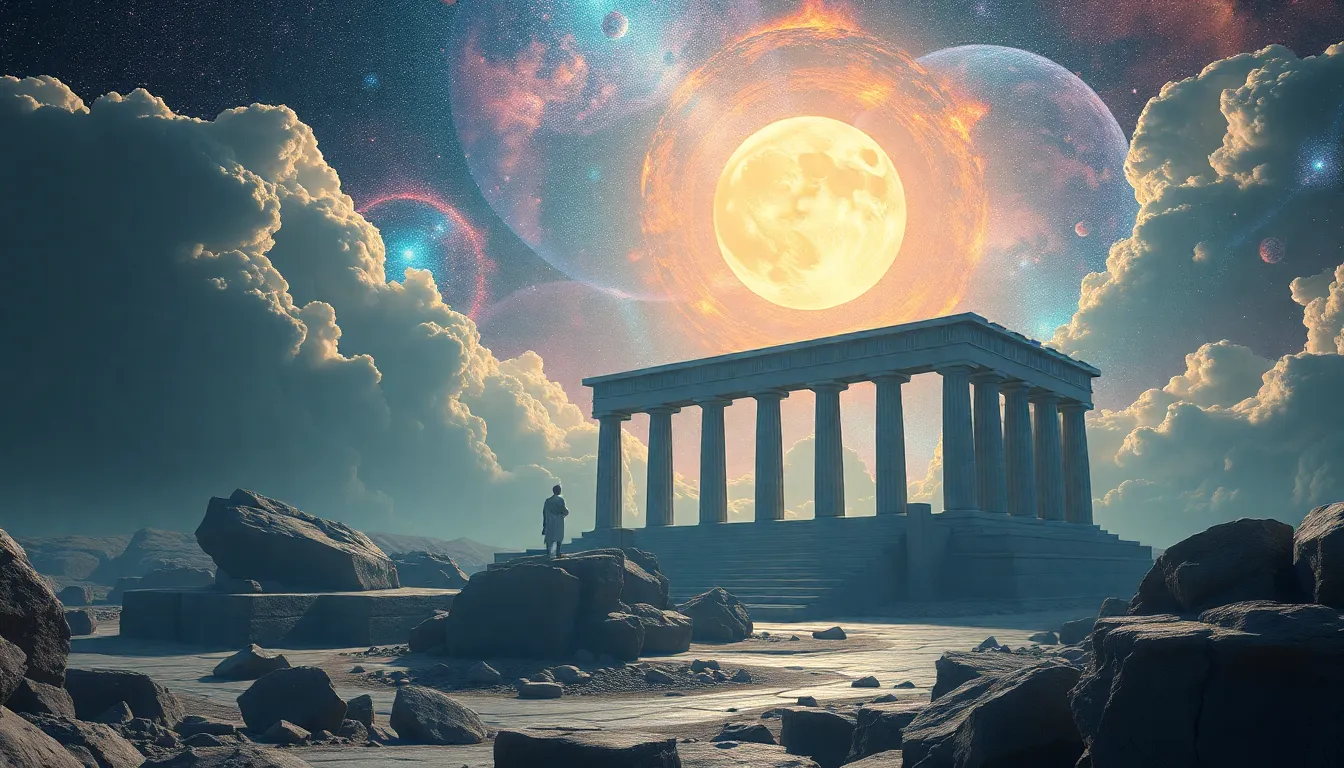The Creation of the Universe: A Greek Perspective
I. Introduction
The ancient Greeks possessed a rich tapestry of myths and philosophical ideas that sought to explain the universe and humanity’s place within it. Understanding the cosmos was not merely a scientific endeavor for the Greeks; it was deeply intertwined with their mythology, religion, and philosophical inquiry. The creation of the universe, as portrayed in Greek thought, reflects both a poetic imagination and a rational quest for meaning.
This article explores the various dimensions of Greek cosmology, focusing on the role of mythology, the insights of early philosophers, and the lasting legacy of these ideas in shaping Western thought.
II. The Role of Mythology in Greek Cosmology
Mythology served as a foundational framework for understanding the cosmos in ancient Greek culture. Theogony, or the birth of the gods, provides insight into how the Greeks viewed creation.
A. Theogony and Primordial Deities
Central to Greek mythology is Hesiod’s “Theogony,” which narrates the lineage of the gods and the origins of the universe. The primordial deities, such as Chaos, Gaia, and Uranus, represent the first elements of existence. Each deity played a significant role in the unfolding of creation:
- Chaos: The void or nothingness from which everything emerged.
- Gaia: The Earth, personified as a goddess, who gave birth to the mountains, sea, and sky.
- Uranus: The sky, who, alongside Gaia, spawned the Titans and other divine beings.
B. Key Myths Related to the Creation of the Universe
Several myths elaborate on the themes of creation, including the tales of the Titanomachy, the battle between the Titans and the Olympian gods, which illustrates the struggle for cosmic order.
III. Hesiod’s Theogony: A Foundation Text
A. Summary of Hesiod’s Narrative on Creation
Hesiod’s “Theogony” is one of the earliest sources of Greek cosmology, detailing the origins of the gods and the universe. It begins with Chaos, from which Gaia, Tartarus, and Eros emerge. Hesiod describes the generations of gods, leading to the reign of Zeus, who establishes order after defeating the Titans.
B. The Significance of Chaos, Gaia, and Uranus
These primordial figures are pivotal to understanding Greek cosmological thought:
- Chaos: Represents the primordial state of the universe, highlighting the transition from chaos to order.
- Gaia: Symbolizes fertility and motherhood, emphasizing the nurturing aspects of the earth.
- Uranus: Illustrates the relationship between earth and sky, a theme central to later philosophical discussions on duality.
IV. Philosophical Interpretations of Creation
While mythology provided a narrative framework for creation, Greek philosophers sought to understand the cosmos through reason and inquiry.
A. Pre-Socratic Thinkers and Their Views
Pre-Socratic philosophers laid the groundwork for rational thought regarding the universe:
- Anaximander’s Concept of the Apeiron: Anaximander proposed the idea of the “Apeiron,” an infinite and boundless principle from which all things arise and return.
- Heraclitus and the Idea of Constant Change: Heraclitus famously stated that “everything flows,” emphasizing the dynamic and ever-changing nature of reality.
B. Plato’s Timaeus and the Demiurge
In “Timaeus,” Plato presents a more structured account of creation. He introduces the Demiurge, a divine craftsman who shapes the cosmos from pre-existing chaos, infusing it with order and intelligibility. This text marks a significant shift from mythological explanations to a more philosophical approach.
V. The Influence of Stoicism on Greek Cosmology
A. Stoic Beliefs Regarding the Universe as a Living Entity
Stoicism further developed Greek cosmological thought by viewing the universe as a single, living organism, governed by rational principles.
B. The Role of Logos in Creation and Order
The Stoics introduced the concept of “Logos,” a rational principle that permeates the universe, establishing order and coherence. This idea influenced later philosophical and theological discussions about the nature of existence.
VI. Differences Between Mythological and Philosophical Perspectives
A. Contrasting Interpretations of Creation
The mythological perspective focused on narratives and personified forces, while philosophical thought emphasized abstract principles and rationality. This dichotomy reflects a broader intellectual evolution in Greek society.
B. The Evolution of Thought from Myth to Rational Philosophy
Over time, the shift from mythological explanations to philosophical reasoning signifies a growing emphasis on observation and logic, paving the way for scientific inquiry.
VII. Legacy of Greek Cosmological Ideas
A. Influence on Later Philosophical and Scientific Thought
Greek cosmological ideas have had a profound impact on Western philosophy, influencing thinkers like Aristotle, the early Christian theologians, and later scientific developments during the Renaissance.
B. The Lasting Impact of Greek Cosmology on Western Culture
The themes of order, the nature of existence, and the interplay between chaos and cosmos continue to resonate in contemporary discussions of cosmology and philosophy.
VIII. Conclusion
In summary, the Greek perspective on the creation of the universe is a rich interplay of mythology and philosophy. From the primordial chaos described in Hesiod’s “Theogony” to the rational inquiries of pre-Socratic thinkers and Stoic philosophers, these ideas have shaped our understanding of existence. The legacy of Greek cosmology remains relevant, as it invites us to ponder the nature of the universe and our place within it in contemporary discussions of cosmology.
As we delve into modern scientific explorations of the cosmos, the reflections of ancient Greek thought remind us that the quest for understanding is an enduring human endeavor.




